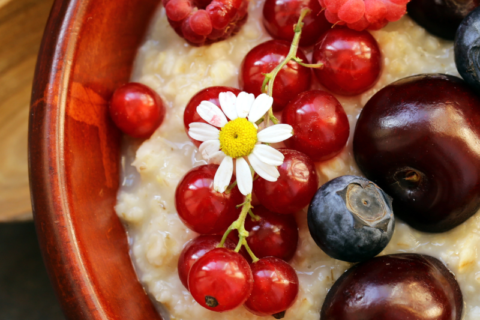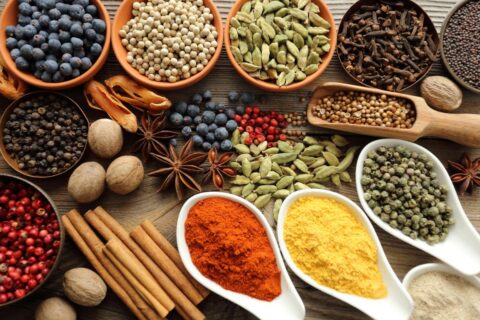
Spices are the magical ingredients that add flavour, aroma, and color to our favourite dishes. They come from all sorts of plants like seeds, fruits, roots, bark etc and are used in cooking to make food taste delicious. Unlike herbs, which mostly come from the leaves or stems of plants, spices have a unique ability to jazz up our meals with their distinct tastes and smells. But did you know that spices aren’t just for cooking? They’ve been used in medicine, religious ceremonies, cosmetics and even perfume making! Take vanilla, for example it’s not just for baking; it’s also a common ingredient in making perfumes smell amazing.
When it comes to using spices, there’s a whole process involved. They can be used fresh or dried, and then they can be grated, chopped, crushed or ground up. Think about how you use peppercorns – maybe you grind them at the table to add some zing to your meal! Some spices, like turmeric, are hardly ever found fresh and are usually bought already ground up. Others, like fennel or mustard seeds, can be used whole or ground, depending on what you’re making.
Spices aren’t just about making food taste good, they’re also a big part of cultures and history. India, for example, produces a whopping 75% of the world’s spices! That’s why Indian food is so full of amazing flavours. Indians know how to use spices like nobody else. Throughout history, spices have been traded and traveled across countries, shaping the way we eat and even the way we explore the world. While we know spices can make our food taste great, scientists are still figuring out if they have any direct effects on our health. So while we sprinkle cinnamon on our morning oatmeal or add a pinch of cayenne to our chilli, we’re also adding a dash of history and culture to our plates.
Let’s explore the health effects of 7 essential spices and how they may contribute to our well-being.
1. Turmeric:
Turmeric, with its vibrant golden hue, is celebrated for its potent anti-inflammatory and antioxidant properties. Curcumin, its active compound, may help alleviate joint pain, reduce inflammation, and protect against chronic diseases like heart disease and cancer.
2. Cinnamon:
Beyond its sweet and spicy flavor, cinnamon may help regulate blood sugar levels, making it beneficial for individuals with diabetes. It also boasts antioxidant properties and may contribute to heart health by lowering cholesterol and blood pressure levels.
3. Ginger:
Ginger is renowned for its digestive benefits, as it may help alleviate nausea, indigestion, and gastrointestinal discomfort. Additionally, gingerol, its main bioactive compound, exhibits powerful anti-inflammatory and antioxidant effects, potentially reducing the risk of chronic diseases.
4. Garlic:
Garlic, known for its pungent aroma and distinctive flavor, packs a nutritional punch with its high content of sulfur compounds. These compounds may help lower blood pressure, reduce cholesterol levels, and strengthen the immune system, promoting overall health and well-being.
5. Cumin:
Cumin seeds are prized for their earthy, warm flavor and may offer digestive benefits by stimulating the production of digestive enzymes. Additionally, cumin contains antioxidants and may help improve blood sugar control, making it a valuable spice for individuals with diabetes.
6. Black Pepper:
Black pepper is more than just a table spice – it contains piperine, a compound that may enhance nutrient absorption and improve digestive health. Piperine also exhibits antioxidant properties and may have anti-inflammatory effects, contributing to overall well-being.
7. Cardamom:
Cardamom, with its aromatic and slightly sweet flavor, is believed to aid digestion and freshen breath. It may also have antimicrobial properties and help alleviate symptoms of respiratory conditions like asthma and bronchitis.
8. Cayenne Pepper:
Cayenne pepper contains capsaicin, a compound that gives it its characteristic heat and may help boost metabolism, promote weight loss, and reduce appetite. It also possesses anti-inflammatory properties and may aid in pain management.
Incorporating these spices into our diet not only enhances the taste of your favourite dishes but also adds a dose of nutritional goodness to your meals. Whether sprinkled over savoury soups, added to aromatic curries, or infused into soothing teas, these spices offer a flavourful journey to better health. So, spice up your life and savour the myriad health benefits that these culinary gems have to offer!
Healthy Lifestyle
Health Benefits of Coriander Leaves | Coriander Seeds
Coriander offers a plethora of health benefits, making it more than just a flavourful herb. Some of its key advantages include: Rich in antioxidants: Coriander…
Health Benefits of Oats
Oats, scientifically known as Avena sativa, are a type of cereal grain widely consumed for…
Unlocking the Potential of Homegrown Herbal Remedies
In today's world, where the focus on natural living and holistic wellness is gaining momentum,…
Exploring the Health Benefits of Dark Chocolate
Chocolate is made from the seeds of Theobroma Cacao tree. As per wikipedia dark chocolate…
Unlocking the Health Benefits of 7 Essential Spices
Spices are the magical ingredients that add flavour, aroma, and color to our favourite dishes.…
Healthy Lifestyle – Take small steps to achieve
In our fast-paced world prioritising a healthy lifestyle is more important than ever. Making conscious…






